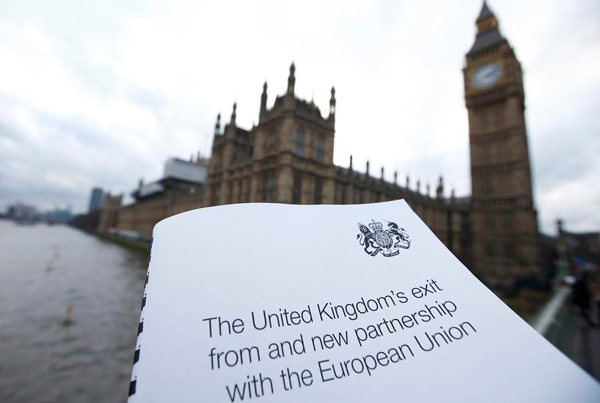 |
|
An illustration shows the white paper setting out Britain's government statergy for departing the European Union, outside Parliament, in London, Britain February 2, 2017. [Photo/Agencies] |
The European Commission released a white paper about the future of Europe last week, through which it aims to trigger a full range of bottom-up debates on social, defense, finance and monetary issues that will define the 28-member bloc's destiny after the United Kingdom leaves it.
The white paper, in which the commission has mapped out five future scenarios for the 60-year-old union, came after EC President Jean-Claude Juncker stressed during his annual state of the union address in September that the European Union was having "existential crises". Juncker will sum up a new policy portfolio in his address in September after the half-year debates have ended.
To achieve this, the EC has set a very clear timetable for the various debates, while elections in the Netherlands, France and Germany, which, dangerously, could result in far-right or populist leaders forming governments, will take place on another track in the coming months. Thus the debates could lead to a decision to either widely consolidate the union, or make it focus only on foreign policy, defense measures and fiscal and monetary regulations.
Basically, the EU has its "constitutional weapon", the Lisbon Treaty, which came into force in late 2009, at hand to unite the bloc. In a way, the future nature of Europe was already agreed upon when the EU member states inked the treaty. But to turn this into reality, the EU has strengthened its financial and banking firewalls during the financial and sovereignty crises of recent years.
Now, the EU's most important role is to find solutions to key questions: Does it want to create better living conditions for young Europeans, whose interests in the EU are fading? Does it want to channel more resources and military capability into the defense sector to safeguard the union's borders? And, does it want to bring the single market closer?
In fact, the Lisbon Treaty has already set the directions, and the answers are surely "yes" to each question. And the debates triggered last week are likely misleading the public, which could think the EU's leaders are lost in implementing the treaty.
European Council President Donald Tusk claims the EU is faced with tremendous "external dangers" after Juncker talked about the "existential crises" last September. Ordinary Europeans already knew the situation and are desperately keen to know the solutions and the timetable ahead, instead of being presented with options to choose from.
In normal times, the EU could have applied this kind of bottom-up approach to "focus minds and find new answers to an old question: What future do we want for ourselves, for our children and for our union?" as Juncker has asked in the white paper.
Now, the situation is critical, both socially and politically in the EU.
To deal with such urgent challenges, swift action, courage, determination and effective leadership are all badly needed, and lengthy debates could erode confidence and trust, meaning the best time to solve the problems could be lost.
The EU had similarly bad experiences when dealing with the financial crisis. The time-consuming debates at the time, and the general elections at the member-state level and corresponding leadership shifts made it difficult to unite and find solutions in a timely fashion. Besides, it took longer than expected to set up firewalls and regulations to strengthen the economic union.
While dealing with social and security challenges, such pitfalls should be avoided.
This year, the UK's departure from the EU, the general elections in some major countries, and the challenges from migration and terrorism will all add a lot of uncertainty and disruption to the market.
These will affect the confidence of the public toward the union. So the EU leaders should seek to inject confidence and courage into the public, which can be done by offering solutions, not scenario analyses.
The author is deputy chief of China Daily European Bureau. fujing@chinadaily.com.cn